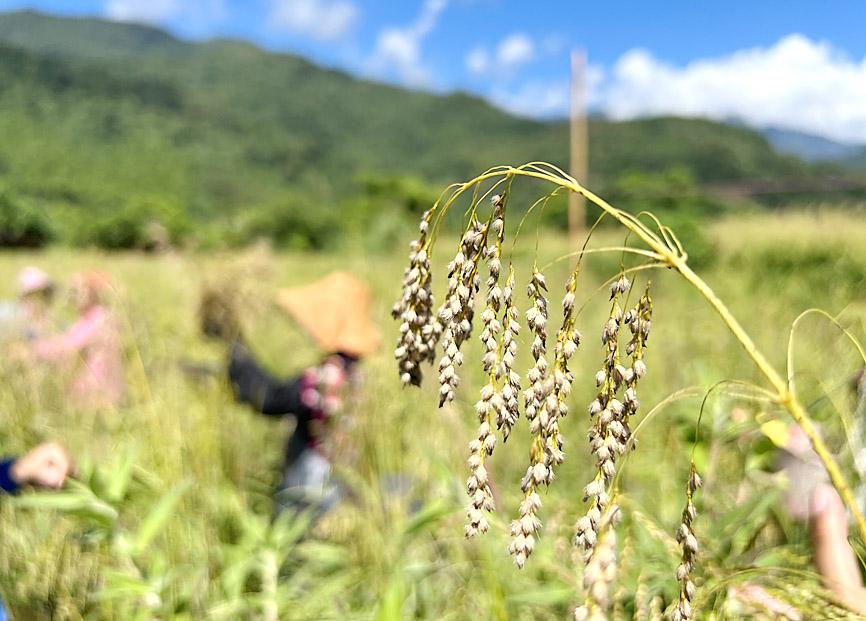The government should promote the growth of Taiwanese oil millet, as the perennial grass is highly tolerant to drought and saline soil, sustainable development groups said on Thursday.
The crop is also flood-tolerant, the groups said, adding that rice could be replaced with oil millet during water shortages to help conservation efforts.
The plant used to be a staple of the Bunun people, before vanishing for half a century following the relocation of the Bunun after the 1941 Pasnanavan incident in Taitung County.

Photo: CNA
The Pasnanavan incident refers to a failed attempt by relocated Bunun to return to their mountain homes by attacking police stations of the then-Japanese colonial government.
The incident only steeled the decision of Japanese authorities in the region to complete the relocation of the Bunun of Pasnanavan to the plains.
The plant, which a young Bunun named Chiu Hsiao-cheng (邱曉徵) and his father reintroduced as a crop five years ago, was sent to Academia Sinica for analysis.
The crop was said to have the potential to be a staple, given the effects of climate change.
Moreover, oil millet had survived after being under water for four days during flooding in 2019, Chiu said.
Climate change has affected the distribution of water resources, said Ling Keng-hung (林耿弘), president of Taitung County’s Youth and Elderly Community Co-creation and Environment Protection Association.
With its high concentration of rice paddies, the first crop of each growing season in the upper fields of the Huadong Valley — the area between the Central Mountain Range and the Coastal Mountain Range, also known as the Hualien-Taitung Valley (花東縱谷) or the East Rift Valley — could be for growing oil millet or similar crops that have high economic value and do not need as much water, Ling said, adding that this would improve the conservation of water resources.
Huang Tzu-yun (黃子芸), an assistant researcher at the Taitung District Agricultural Research and Extension Station, said that the station is studying how to promote oil millet as a crop, as it has high nutritional value and is adaptable to climate change.
Academia Sinica Institute of Plant and Microbial Biology assistant researcher Hsu Tzu-fu (徐子富) said that during the most severe water shortage in half a century last year, oil millet was less affected than other crops that rely on copious amounts of water.
A perennial plant, oil millet can be harvested by scything it above the roots, with no need to reseed, Hsu said, adding that tilling is only required every three years.
Compared with rice paddies or wheat fields, which need to be tilled every 100 to 120 days, and six months respectively, oil millet fields have a much better carbon fixation rate, he said.
“We hope to work with US and Japanese academics and make a proposal to UNESCO to have oil millet considered a world cultural heritage,” he said.
“We hope that Taiwan could contribute, in some form, to help resolve potential global food supply crises,” he said.

Taiwan has received more than US$70 million in royalties as of the end of last year from developing the F-16V jet as countries worldwide purchase or upgrade to this popular model, government and military officials said on Saturday. Taiwan funded the development of the F-16V jet and ended up the sole investor as other countries withdrew from the program. Now the F-16V is increasingly popular and countries must pay Taiwan a percentage in royalties when they purchase new F-16V aircraft or upgrade older F-16 models. The next five years are expected to be the peak for these royalties, with Taiwan potentially earning

STAY IN YOUR LANE: As the US and Israel attack Iran, the ministry has warned China not to overstep by including Taiwanese citizens in its evacuation orders The Ministry of Foreign Affairs (MOFA) yesterday rebuked a statement by China’s embassy in Israel that it would evacuate Taiwanese holders of Chinese travel documents from Israel amid the latter’s escalating conflict with Iran. Tensions have risen across the Middle East in the wake of US and Israeli airstrikes on Iran beginning Saturday. China subsequently issued an evacuation notice for its citizens. In a news release, the Chinese embassy in Israel said holders of “Taiwan compatriot permits (台胞證)” issued to Taiwanese nationals by Chinese authorities for travel to China — could register for evacuation to Egypt. In Taipei, the ministry yesterday said Taiwan

‘LIKE-MINDED PARTNER’: Tako van Popta said it would be inappropriate to delay signing the deal with Taiwan because of China, adding he would promote the issue Canadian senators have stressed Taiwan’s importance for international trade and expressed enthusiasm for ensuring the Taiwan-Canada trade cooperation framework agreement is implemented this year. Representative to Canada Harry Tseng (曾厚仁) in an interview with the Central News Agency (CNA) said he was increasingly uneasy about Ottawa’s delays in signing the agreement, especially as Ottawa has warmed toward Beijing. There are “no negotiations left. Not only [is it] initialed, we have three versions of the text ready: English, French and Mandarin,” Tseng said. “That tells you how close we are to the final signature.” Tseng said that he hoped Canadian Prime Minister Mark Carney

POSITIVE DEVELOPMENT: Japan and the US are expected to hold in-depth discussions on Taiwan-related issues during the meeting next month, Japanese sources said The holding of a Japan-US leaders’ meeting ahead of US President Donald Trump’s visit to China is positive news for Taiwan, former Japan-Taiwan Exchange Association representative Hiroyasu Izumi said yesterday. After the Liberal Democratic Party’s landslide victory in Japan’s House of Representatives election, Japanese Prime Minister Sanae Takaichi is scheduled to visit the US next month, where she is to meet with Trump ahead of the US president’s planned visit to China from March 31 to April 2 for a meeting with Chinese President Xi Jinping (習近平). Japan and the US are expected to hold in-depth discussions on Taiwan-related issues during the